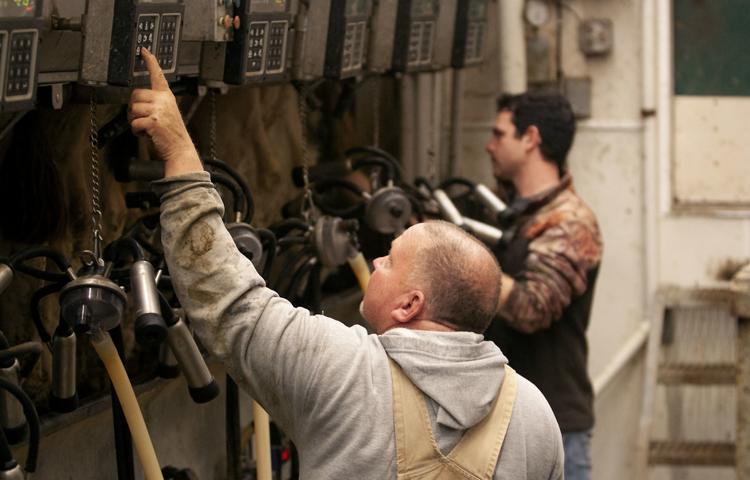
Ray Ashbaugh clears the monitor to the milking machine during routine evening milking Nov. 5 at the R.T. Wright Farm. Misssouri farmers are struggling to keep the dairy industry profitable due to oversupply, drought and tariffs. Jusani Jackson
It’s early in the morning on a Chesterfield, Missouri, dairy farm in late October, the shivering rains drenching the farmhands as they make their first of two daily milking stops.
These early morning hardships are a microcosm of the tribulations that dairy farmers have undergone in recent years.
Missouri’s dairy farmers, like thousands of other dairy farmers throughout the nation, are fighting to keep their industry afloat in the face of oversupply, drought and tariffs.
In the last year alone, the dairy industry has suffered more than a billion dollars in losses.
Oversupply has been one factor in the dairy industry’s struggles for more than four years according to David Drennan, executive director for the Missouri Dairy Farmers Association.
A contributory factor to oversupply is the uncertainties in production that dairy producers face when compared to other industries.
“You can’t shut the plant down like Coca-Cola can. Those cows keep producing,” Drennan said. “Worldwide we have an oversupply of milk compared to what the demand is.”
Missouri’s dairy problems were further compounded this summer by one of its worst droughts in years.
“We were affected more than any state,” Drennan said.
Dairy farmers in Missouri depend heavily on healthy pasture to feed their cows, particularly in southern Missouri.
With much of the land falling victim to the drought, farmers were forced to import large numbers of seeds, creating additional expenses.
At one point in the summer, three-quarters of Missouri’s pastures were rated in either poor or very poor condition according to the U.S Department of Agriculture.
“If you don’t have feed for your cows, then the only option is you have to get rid of them,” Drennan said.
Drennan said he’s seen roughly 30 to 40 dairy farmers in Missouri closed down because they couldn’t afford to maintain their farm any longer.
In an effort to mitigate some of the losses, the U.S. Department of Agriculture committed $127 million in aid to the dairy farming industry, part of a $12 billion package for U.S. farmers.
Despite the government’s assistance, the funds have done little to improve financial conditions after years of financial losses.
“It’s just a drop in the bucket, no pun intended,” Drennan said.
Foreign tariffs imposed on U.S. dairy products this year are the latest in a seemingly never-ending series of obstacles for dairy producers.
These retaliatory tariffs from NAFTA trading partners Mexico and Canada were placed in response to U.S. tariffs on steel and aluminum.
“Typically, our exports of dairy peaked at around 17 percent of our production,” Drennan said. “They dropped back, I think, now to around 12 or 13 percent.”
Chairman of the National Milk Producers Federation and member of Missouri’s State Milk Board Randy Mooney wrote an urgent letter Oct. 23 to the USDA informing them of their critical situation.
“U.S. dairy farmers have endured low prices for several years,” Mooney said. “The average price we received from 2015 to 2017 was 18 percent below the average price received from 2011 to 2014.”
Mooney pointed to estimates from multiple economic modeling studies indicating falling milk prices, and a projected $1.5 billion in lost income in 2018.
“NMPF is not alone in this assessment,” Mooney said. “USDA’s own monthly World Agricultural Supply and Demand Estimates showed a drop in its forecast milk prices.”
Officials like Mooney and Drennan are hopeful that the U.S.’s new trade agreement and potential future agreements with other countries will help the dairy industry regain its footing.
“These trade agreements are paramount; they’re very important not only to dairy but all of agriculture,” Drennan said.
Drennan noted the potential for improvement in the U.S. dairy industry if new trade agreements can be reached.
“We know they need more dairy. We know they need more of our agricultural products,” Drennan said. “We just have to redouble our efforts to get these trade agreements back on track and expand our markets, new and existing.”
Source: nwmissourinews.com









